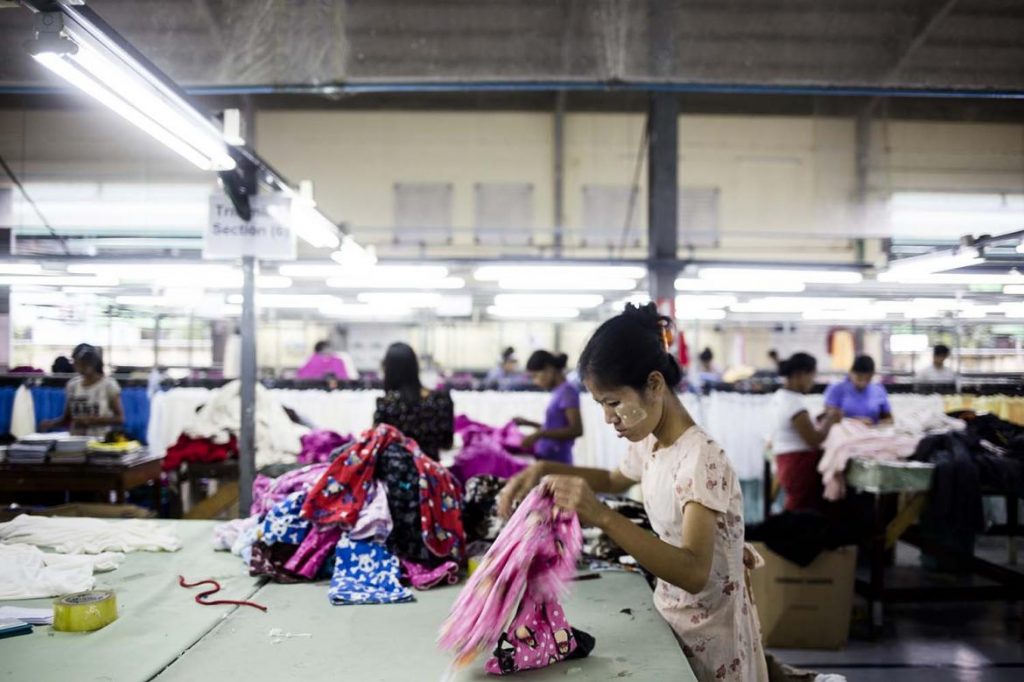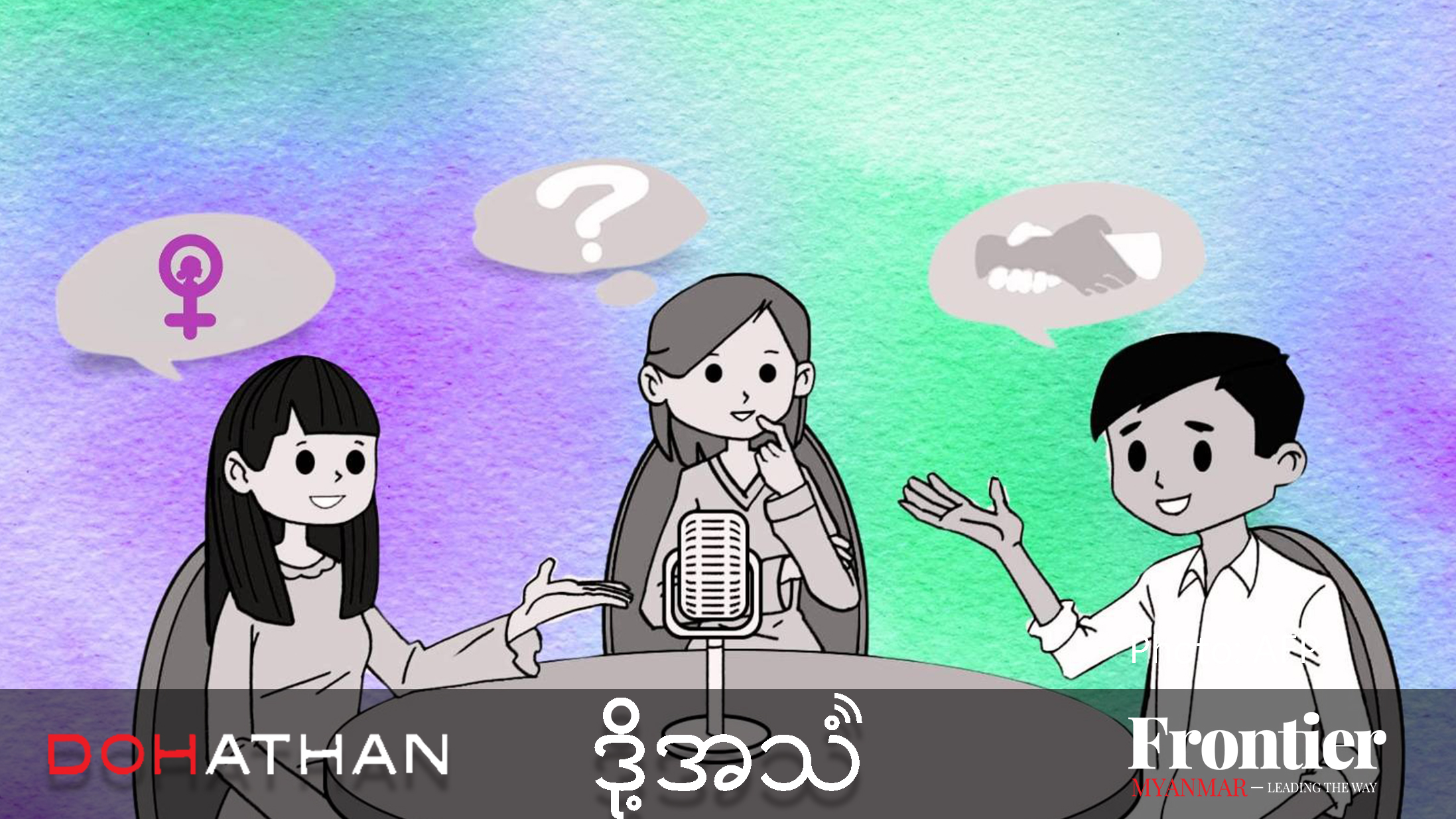A trade ban imposed on Myanmar by the United States in 2003 savaged the garment industry and forced some young women into prostitution.
By GEOFFREY GODDARD | FRONTIER
A GREAT contradiction of the move by the European Union to consider withdrawing trade privileges from Myanmar as punishment for the Rohingya crisis is that it is justified by the need to protect human rights.
If the EU eventually withdraws the trade privileges granted under its Generalised Scheme of Preferences – a process that will take about a year – and the sanction is applied to all exports, the garment industry will be devastated. Hundreds of thousands of workers, mainly young, single women, will be at risk of losing their jobs, and if that happens the relatives who rely on their remittances will lose a lifeline.
Some of the newly jobless women will be so desperate to support their families that they will prostitute themselves. We know that because it happened in 2003 after the United States banned all imports from Myanmar.
The ban was imposed in response to the Depayin incident in May 2003, when junta-backed thugs ambushed a convoy carrying Daw Aung San Suu Kyi during one of the national tours on which the opposition leader had embarked after her release from house arrest a year earlier. Scores of NLD supporters were reported to have died in apparent attempt to kill Aung San Suu Kyi, who was placed under “protective custody” after the incident before being returned to house arrest, which was not lifted until November 2010.
Support more independent journalism like this. Sign up to be a Frontier member.
When Washington imposed its trade ban in July 2003 the effect on the garment industry and its employees was brutal; the sector had been accounting for 80 percent of Myanmar’s exports to the US.
In his December 2005 paper on the impact of the US import ban on the garment industry, Japanese researcher Mr Toshihiro Kudo said the sector had developed 55 times its initial export capacity between 1990 and 2002. Kudo estimated that the US sanctions resulted in the closure of about 150 garment factories and the loss of between 70,000 and 80,000 jobs.
On October 2, 2003, the deputy assistant secretary of the US State Department and chief of its bureau of East Asia and Pacific Affairs, Mr Matthew Daley, discussed the effect of the sanctions when he testified before the International Relations Committee of the House of Representatives.
Daley said imposing the sanctions had “immediately disrupted” the Myanmar economy and had particularly affected industries reliant on exports to the US, with the garment sector hit the hardest.
“Unfortunately, the sanctions also affect ordinary people,” Daley acknowledged.
“I note that some international NGOs have expressed concern that the destruction of already troubled export industries, especially the garment sector, will lead to significant unemployment and a spike in economic migrants seeking illegal work inside Burma or over the border in Thailand or China,” he said.
“Within the first month of sanctions, we estimate that more than 40,000 garment sector jobs were lost. In the long term, the garment sector will likely lose 100,000 jobs, most of which were filled by young women. We have credible reports that the concern voiced by some INGOs concerning the fate of these women is well founded and that some have entered the flourishing illegal sex and ‘entertainment’ industries.”
The EU’s decision to reinstate trade privileges to Myanmar in 2013 as a reward for reforms undertaken by the Thein Sein government has been a boon for the garment sector, which has flourished to become the country’s top export earner after oil and gas.
The EU is a big buyer of garments made in Myanmar. In 2017, garments comprised nearly three-quarters of Myanmar’s exports to the EU valued at €1.56 billion (US$1.81 billion), 10 times their value in 2012.
The Myanmar Garment Manufacturers Association says the sector has more than 600 factories, most of which are on the outskirts of Yangon, and a workforce of about 450,000 people.
MGMA chair U Soe Myint has said that more than half of all garment workers’ jobs will be at risk if the EU withdraws trade privileges.
He recently told Frontier that the possibility of the EU imposing trade sanctions on the industry recalled the “experience we had in 2003”.
The reported impetus for the EU move was the UN Fact-Finding Mission report into human rights abuses in Rakhine, Kachin and Shan states that called for senior Tatmadaw officers be investigated for genocide, crimes against humanity and war crimes.
After the FFM’s full report was released in September, the European Parliament called on the European Commission, the EU executive body responsible for trade policy, to review Myanmar’s trade privileges.
In its October 3 report revealing the EU sanctions move, Reuters said there were differences over the issue within the commission.
“We are concerned about the impact on the population from our potential measures, but we cannot ignore a UN report describing the military campaign as genocide,” a European Commission official told Reuters, referring to the Tatmadaw “clearance operation” in Rakhine.
The EU is a powerful force for good in our troubled world and the emphasis it places on upholding human rights and democratic values should be a model for all regional groups.
If the EU decides to withdraw all trade privileges granted to Myanmar, including the garment sector, it will amount to inflicting misery on innocent workers because of misery inflicted on the defenceless by the culpable.
How can that be in the interest of upholding anyone’s human rights?







